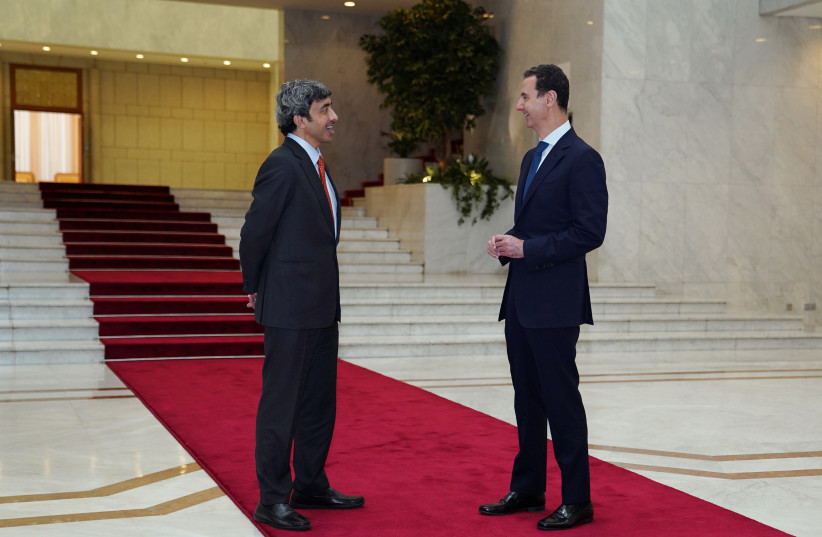The foreign ministers of Jordan, Saudi Arabia, Iraq, Egypt, and Syria met in Amman on Monday to discuss Syria’s reentry into the Arab League. The talks, which include the discussion of obligations that Syria must fulfill in order to reenter, are part of an initiative led by Jordan.
For more stories from The Media Line go to themedialine.org
A summary statement produced after the meetings mentioned the need to “prioritize ending the Syrian crisis.”
The talks were a follow-up to an earlier meeting of the Gulf Cooperation Council member states that was held in Jeddah, Saudi Arabia on Apr. 14. That meeting, held at Saudi Arabia’s invitation, was also attended by Jordan, Iraq, and Egypt. Monday’s meeting in Amman introduced the presence of Syria’s Foreign Minister Faisal Mekdad as well.
Jordanian political analyst Amer Al Sabaileh told The Media Line that the meeting had laid the groundwork for Syria’s return to the Arab League. “If Syria can return to the Arab League, that will have a big meaning in the follow-up discussions with the international community, especially the US,” Al Sabaileh said.
He noted that as the Syrian crisis has gone on now for 12 years, “the international community is largely staying away and thus causing the region to pay a high price for the isolation and sanctions against Syria.”

Jordan’s effort is based on the concept of a reciprocal road map. Arab countries will make gradual positive steps toward Syria as Syria addresses those countries’ concerns.
The meeting’s final communique reflects two major concerns of Syria’s neighboring Arab countries: the presence of foreign militias in Syria and the proliferation of synthetic drugs produced in the country.
According to the statement issued at the end of the meeting, “Syria will work with Jordan and Iraq in forming two joint political/security working groups within a month to identify the sources of drug production and smuggling in Syria. The groups will look for drug smugglers and take action to end smuggling operations.
“The ministers also agreed on actions to address security challenges related to border security by establishing coordination mechanisms between the Syrian military and security agencies and their counterparts in neighboring countries.”
Opposition to Syria rejoining the league
Jordan and Saudi Arabia’s apparent success in beginning to return Syria to the Arab League stands in contrast to Algeria’s failed attempt last year.
Shortly after the conclusion of the meeting, Jordan’s foreign minister Ayman Safadi reached out to representatives from Arab countries that did not attend to brief them on the results of the meeting. Qatar, Kuwait, and Morocco have been opposed to the return of Syria to the Arab League.
The 32nd Arab League Summit is expected to be held in Saudi Arabia on May 19. Saudi Arabia has said that it will invite the Syrian president to the summit, but such an invitation would require the consensus of all member countries.
Commentators in the Arab world have said that the situation in the region has developed to allow a gradual normalization of relations between Arab countries and President Bashar al-Assad’s Syria. It is unclear whether Syria’s return to the Arab League would be enough to lift international sanctions on Syria. Al Sabaileh said that efforts to remove sanctions would be strengthened if the Arab League were to pursue them.
Some hoping for a removal of sanctions on Syria were heartened by the waiver that allowed the transfer of earthquake-related humanitarian supplies to Syria despite the US Caesar Act, a set of sanctions imposed on the Syrian government and its allies to hold them accountable for human rights abuses and war crimes. Without the waiver, the act would have deterred participation in Syrian government-led reconstruction efforts.
The statement issued at the end of the meeting also noted that “the Amman Consultative Meeting marks the beginning of a series of meetings that aim to discuss and resolve the Syrian crisis in line with Security Council Resolution 2254 and address the consequences of the humanitarian, political and security crisis.”
UN Security Council Resolution 2254 calls for an immediate cease-fire in Syria and a political transition. The resolution was passed unanimously in 2015.
The ministers agreed to deliver humanitarian and medical aid to Syria in cooperation and coordination with the Syrian government and the UN.
They also welcomed the Syrian government's decision to open the Bab al-Salam and al-Rai border crossings to UN humanitarian and medical aid after the earthquake that struck Syria in February.
The ministers stated that the voluntary and safe return of Syrian refugees to their country is a “top priority,” and that actions “must be taken immediately.” They discussed strengthening cooperation between the Syrian government and refugee host countries as well as coordinating with the UN to organize voluntary and safe returns for refugees.
The Arab countries’ initiative reflects the US’s shrinking role in the Middle East. Amid the changing geopolitical dynamics, Iran’s President Ebrahim Raisi is heading a high-ranking political and economic delegation to Syria on Wednesday at the invitation of President Asaad.
